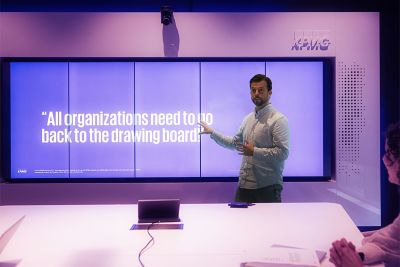The development of Artificial Intelligence (AI) is having significant impact on the economy and society, increasingly influencing our lives. This presents tremendous opportunities, but at the same time raises questions about how the technology works and the reliability of its outcomes.

How can AI transform organizations?
Artificial Intelligence is transforming the way organizations operate. From improving efficiency and productivity to driving innovation and growth. Inspiring case stories show how AI is playing a crucial role in shaping the future of organizations and highlight the importance of careful implementation of AI solutions.
Check out the stories and discover how your organization can benefit from the power of AI.
AI Explained for Organizations
Schedule an AI Workshop
Do you need to concretize the possibilities of AI for your organization? Or do you want to discover what actions you need to take to set up your organization with and for AI responsibly, sustainably and human-centered?
KPMG is happy to help you further in this interactive and customized AI workshop. In the Insights Center at KPMG in Amstelveen, together with your team and the KPMG AI experts, you will work on different use cases from your sector, dive into the world of AI and set up practical guidelines for reliable and qualitative AI adoption. In just a few hours, you'll walk out with concrete, hands-on actions to shape your AI journey.
Our insights
With the increasing use of artificial intelligence, as well as the complexity of the technology, it is not surprising that organisations are growing in need of knowledge, expertise and insight around how AI works. We have listed the key insights for you below.
AI and Process Optimization
IT was once synonymous with rigid, hard-to-adapt systems. With the advent of new generations of AI applications, however, a flexible world is emerging in which users can largely shape their processes themselves. The trick is, on the one hand, to make the most of that freedom so that users can realise their ideas immediately, and, on the other, to do so in the context of a collaboration that transcends departments and processes.
AI and Culture & Change
The success of AI is not about technology. It's about people who can extract value from this technology and, by extension, an organisation with sufficient resilience, curiosity and adaptability. And exactly at the point of building such an organisation, AI can provide valuable insights.
AI and Ethics & Compliance
Every new technology has a bright side and a not-so-bright side, and AI is no exception. This groundbreaking technology offers many organisations attractive strategic potential, but it also brings with it new issues of reliability and ethics, among others – and consequently, challenges in building trust in the technology.
AI and Privacy & Regulations
The landscape of laws and regulations surrounding Artificial Intelligence is evolving rapidly and posing challenges to organisations. Part of that challenge involves efficiency in complying with a plethora of regulations, but at least as important is responding adequately to societal expectations.
AI and Data
Imagining the possible applications for Artificial Intelligence is not difficult. You will probably also be able to formulate concrete ideas about it. But ultimately it all comes down to using quality data as input for AI. For the old cliché ’garbage in, garbage out’ is still true today.
AI and Audit
Society cannot function without trust, and the accountant, as auditor, plays a key role in that trust. With Artificial Intelligence, the accountant's work can provide an entirely new level of assurance and thus respond to what society expects.
Generative AI
Artificial Intelligence is bringing about a total transformation of the organisation, and at the tipping point of that transformation, many traditional conventions are falling overboard. What doesn't change is that organisations still face the question of how to create value – now and in the longer term. That question must remain central to the deployment of AI.
How can KPMG help?
It is certain that there are still many questions and uncertainties about the future impact of AI on society. For example, what will the new cooperation between humans and machines look like in an era where AI takes a leading role? Will humans primarily train the AI models, and if so, how ethical is it that in doing so they may make themselves obsolete? And how can we ensure that AI continues to function responsibly?
KPMG explores these issues with clients, defines an agenda with them to confidently enter the transition, and prepares organisations for an era of AI. By continually starting from ‘connecting the dots’ of the aforementioned perspectives, we avoid an opportunistic and/or fragmented approach and arrive at a structural and holistic strategy. Get in touch with one of our experts or schedule an AI Workshop.















































